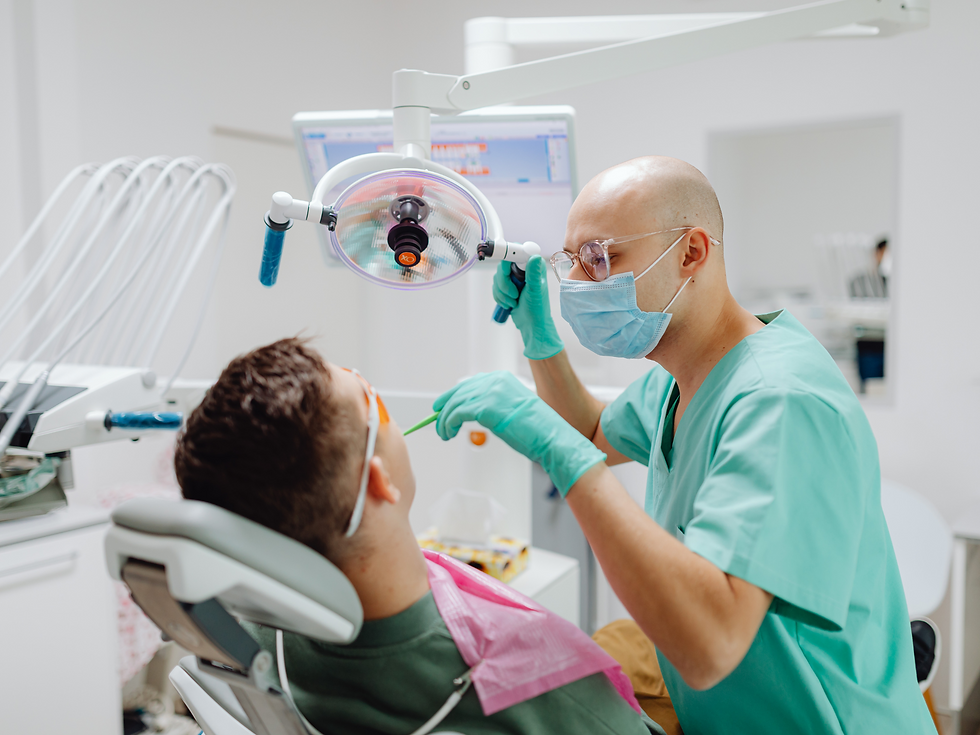What’s That Smell? Understanding (and Solving) the Mystery of Bad Breath
- Avneet Dhaliwal
- Aug 15, 2025
- 3 min read
Introduction
Bad breath, also known as halitosis, can feel uncomfortable and even discouraging. Whether it’s a faint odor or something more noticeable, bad breath can affect your confidence in work, social, and family settings. The good news is that with the right habits and awareness, you can maintain fresh breath and a healthy mouth.
If you’re searching for a family dentist near me, this guide explains the most common causes of bad breath and how your dentist can help you tackle it for good.

What Causes Bad Breath?
Bad breath doesn’t just happen for one reason. There are several common causes, and often, more than one factor plays a role. Let’s look at the most common culprits.
Poor Oral Hygiene
The leading cause of bad breath is inadequate oral hygiene. When you don’t brush and floss regularly, food particles stay stuck between teeth and along the gumline. Bacteria feed on these particles, producing foul-smelling sulfur compounds that cause bad breath.
Dry Mouth
Saliva naturally washes away food particles and bacteria. When your mouth is dry, it doesn’t produce enough saliva to naturally wash away debris and bacteria. Dry mouth can be caused by dehydration, certain medications, or mouth breathing, especially at night.
Gum Disease
Ongoing bad breath can also be an early sign of gum disease, also known as periodontal disease. Gum disease develops when plaque accumulates along the gumline, causing irritation, inflammation, and possible infection. The bacteria linked to gum disease create persistent odors that regular brushing alone often can’t eliminate.
Diet and Lifestyle
What you eat matters, too. Foods like garlic, onions, and spicy dishes can temporarily cause bad breath. Smoking or using tobacco products also leaves a lingering smell and increases the risk of gum disease.
Other Health Conditions
Sometimes, bad breath is linked to conditions beyond your mouth. Conditions such as sinus infections, acid reflux, diabetes, and liver or kidney problems can also cause unpleasant breath. If improving your oral care doesn’t resolve bad breath, it’s crucial to consult your dentist or doctor for further evaluation.
How to Prevent Bad Breath
Most bad breath problems can be controlled with good daily habits and regular dental visits. Here are practical steps to keep your breath fresh every day.
Brush and Floss Daily
Brush your teeth twice daily and floss once a day to effectively remove food particles and plaque buildup. Remember to replace your toothbrush every three months or sooner if the bristles become frayed.
Clean Your Tongue
Bacteria and food particles can accumulate on your tongue, leading to unpleasant odors. Use a tongue scraper or gently brush your tongue every time you brush your teeth.
Stay Hydrated
Drink plenty of water throughout the day. Staying hydrated keeps saliva flowing and helps rinse away bacteria and food particles.
Watch Your Diet
Limit foods that are known to cause bad breath and try to include crunchy fruits and vegetables like apples and carrots, which help clean teeth naturally.
Quit Smoking
If you use tobacco products, quitting is one of the best steps you can take for your breath and your overall oral health.
Schedule Regular Dental Visits
Seeing a family dentist for routine cleanings and checkups is essential. Professional cleanings remove stubborn plaque and tartar that brushing alone can’t reach. Your dentist can also spot early signs of gum disease and other issues that may be causing bad breath.

How Five Oaks Dental Can Help
At Five Oaks Dental, we understand how uncomfortable bad breath can be. Our experienced team works closely with patients to find the root cause of halitosis and provide personalized treatment. Whether you need a deep cleaning, gum disease therapy, or advice on improving your daily routine, we’re here to help you restore confidence in your smile and keep your breath fresh.
Freshen Up with Help from a Family Dentist
Bad breath doesn’t have to be a lingering problem that makes you feel self-conscious. By understanding what causes it and taking small, consistent steps at home, like brushing, flossing, staying hydrated, and eating a balanced diet, you can keep your breath fresh and your mouth healthy every day.
However, when bad breath doesn’t go away or keeps coming back, it’s time to reach out to a family dentist. A professional dental team can identify hidden issues like gum disease or dry mouth, provide deep cleanings that regular brushing can’t match, and offer personalized advice to keep your breath smelling clean long-term.
If you’ve been struggling with embarrassing bad breath, don’t put it off any longer. Visiting a trusted family dentist can give you peace of mind, help you get to the root of the problem, and boost your confidence in every conversation. Fresh breath, healthy teeth, and a brighter smile are all within your reach, and it starts with a visit to your local family dentist.




Comments